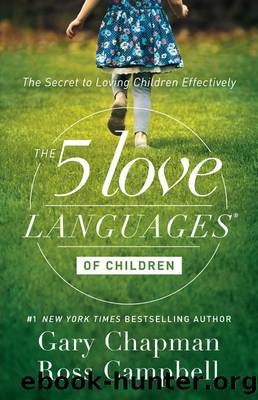The 5 Love Languages of Children: The Secret to Loving Children Effectively by Gary Chapman & Ross Campbell

Author:Gary Chapman & Ross Campbell [Chapman, Gary]
Language: eng
Format: azw3
ISBN: 9780802493767
Publisher: Moody Publishers
Published: 2016-04-14T16:00:00+00:00
Learning and the Love Languages
Parents are a childâs first and most important teachers. Researchers now agree that the optimum time for the stimulation of basic learning abilities in a child is before the age of six. Dr. Burton White, a famed pioneer in early learning research and the founder of the Harvard Preschool Project, says, âIt appears that a first-rate educational experience during the first three years of life is required if a person is to develop to his/her full potential.â1 And sociologists and educators, convinced such stimulation of the very young can spur learning abilities, have created programs such as Head Start designed to help disadvantaged children during their preschool years.
Yes, we parents are the primary teachers. And one of our primary teaching aids is proper discipline, administered with love.
In chapter 8, we considered discipline as guiding to maturity. Now letâs consider the other half of the classical idea of discipline: teaching our children. True discipline can help to develop a childâs intellect and social skills that will serve him for a lifetime.
The increased awareness in recent years of the importance of early childhood learning underscores our crucial role as parents in our childâs developing intelligence. This does not mean you must conduct formal lessons with your young child. But you should try to understand your childâs innate drive to learn, to explore, and then to satisfy his developing brainâs urgent need for sensory stimuli and enjoyable learning experiences.
Many parents watch their childâs primary occupation of play and think learning can be left for first grade. But small children love to learn. They are born with an innate hunger for learning that remains strongâunless adults bore, spank, train, or discourage it out of them. A careful observation of infants and toddlers reveals that most of their activity is not merely childâs play. Rather, our little ones are working at learning a new skill, whether it is to flip from the stomach to the back; to crawl; to pull up and later walk; or to touch, feel, and taste the world around them.
Once they learn to talk, their minds are filled with questions, and three- and four-year-olds can ask dozens of questions every day. When they reach the imitative stage and pretend to be adults, they seldom copy grown-ups at play. Rather, they imitate adults at work: teaching, driving a truck, being a doctor or nurse, caring for babies, working as a âbusinessman,â and more. If you observe your childâs activities for just one day and ask, âWhat seems to make her happiest? What holds her attention the longest?â you will likely find that it is an activity in which she is learning.
Download
This site does not store any files on its server. We only index and link to content provided by other sites. Please contact the content providers to delete copyright contents if any and email us, we'll remove relevant links or contents immediately.
The 5 Love Languages: The Secret to Love That Lasts by Gary Chapman(8499)
The Space Between by Michelle L. Teichman(6088)
Assassin’s Fate by Robin Hobb(5238)
Wiseguy by Nicholas Pileggi(4586)
Everything Happens for a Reason by Kate Bowler(4067)
Gerald's Game by Stephen King(3919)
A Simplified Life by Emily Ley(3573)
The Power of Positive Thinking by Norman Vincent Peale(3450)
Pillow Thoughts by Courtney Peppernell(3398)
Resisting Happiness by Matthew Kelly(2888)
Girl, Wash Your Face by Rachel Hollis(2822)
Being Aware of Being Aware by Rupert Spira(2709)
Name Book, The: Over 10,000 Names--Their Meanings, Origins, and Spiritual Significance by Astoria Dorothy(2492)
Real Sex by Lauren F. Winner(2476)
More Language of Letting Go: 366 New Daily Meditations by Melody Beattie(2444)
The Holy Spirit by Billy Graham(2418)
Fast Facts on Defending Your Faith by John Ankerberg & John Weldon(2390)
Victory over the Darkness by Neil T. Anderson(2386)
The Secret Power of Speaking God's Word by Joyce Meyer(2253)
